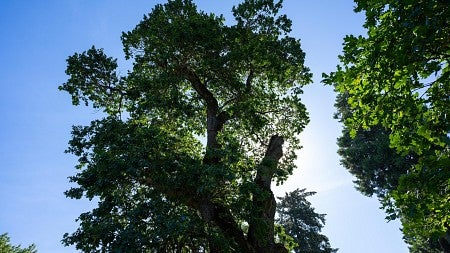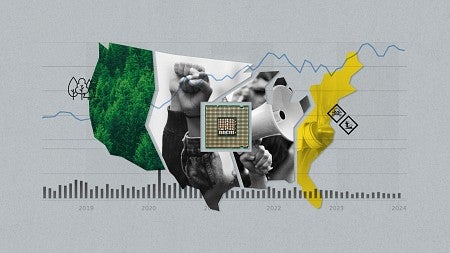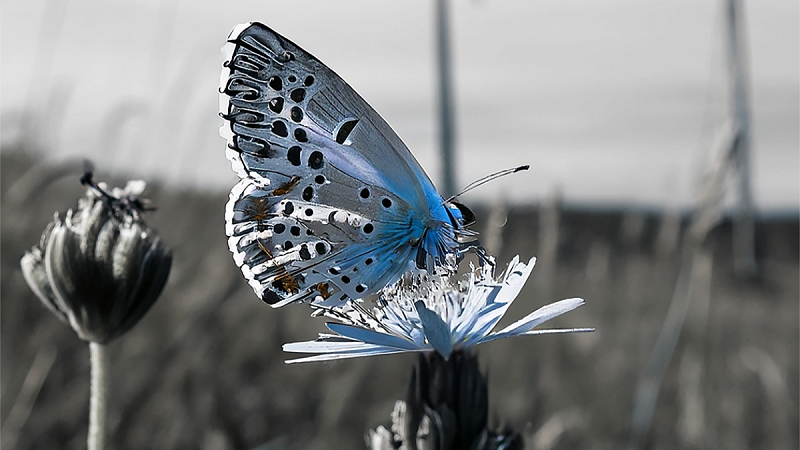
Spinning Stories of Climate Change and a Fragile Planet
Alum Ross West pens cli-fi collection with provocative questions but no easy answers
By Sharleen Nelson • March 27, 2024
4 min read
Food insecurity, carbon footprints, environmental justice, global warming: wide-ranging and complex issues of climate change are in the headlines every day, generating passionate debate but few solutions.
Author Ross West, MFA ’84 (creative writing), tackles these complicated topics through the lens of literature in The Fragile Blue Dot: Stories from Our Imperiled Biosphere, a climate fiction book that hits bookstores on Earth Day, April 22.
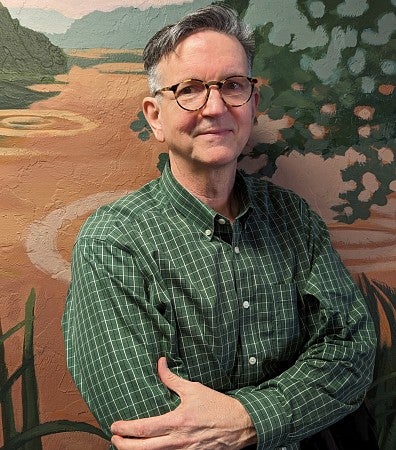
“One of the functions of fiction, and the arts in general, is to address the pressing issues of the time,” West says. “The readers who I imagine will be most interested in this book are among the millions of people worried about the livability of their planet, the world they will leave to future generations, and living in an era plagued with fears concerning our very survival.”
West worked for University of Oregon communications from 1995 to 2014 as a science writer and later managing editor of Oregon Quarterly. He wrote “Smoke, Fire, Ashes”, the first story for Fragile Blue Dot, in 2019:
. . . I pull the covers over my head and roll up into a ball, small as I can be. I start to shake and squeeze my arms tight against my chest and try not to think about anything and remember that right before I woke up I was dreaming. There was a big horrible forest fire, roaring into a town like that one in California, Paradise. Everybody running and screaming, driving their cars all crazy trying to escape. Smoke and fire and ashes. Every building burning until there wasn’t a single thing left. Stupid greedy adults. Greta blames them, says they’re the ones who wrecked everything and it’s us kids who are gonna pay. You stole our childhood and you stole our future. How dare you. We’ll never forgive you. I will never ever ever forgive you.
“I knew [climate change] was an issue of our time and saw that it would likely continue to be one for years to come,” West says. “But it didn’t occur to me until after I’d written a couple of them that it was a theme that I wanted to explore. Since then, concerns about climate change have only intensified.”
Fifteen award-winning, timely, and thought-provoking stories of subtle change and colossal catastrophe raise complicated questions while exploring how the problem affects everyone—from industries and workers to families and endangered species—in big and small ways.
Characters struggle with the complexities of lives contorted by climate change.
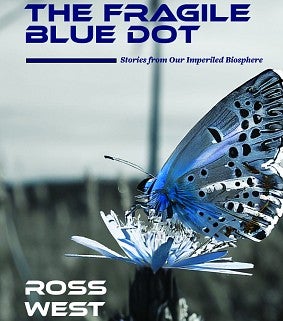
“It occurred to me that we were living in the age of climate change and that was going to affect all of our lives in innumerable ways,” West says. “Even as people work to inform themselves about the facts and science of climate change, they are also hungry for fictional explorations of its manifold subtleties and implications in today’s world as well as possible worlds they may soon be facing.”
Stories in Fragile Blue Dot include:
- A high school boy embraces a radical eco-ideology and resorts to violence after a climate-caused forest fire burns down his home and town.
- A glaciologist’s burgeoning career threatens to tear her marriage apart while the couple paddles kayaks amid calving Alaskan glaciers.
- An engineer building a solar power generation facility discovers that clean energy production will eradicate an endangered species of butterfly.
- The manufactured paradise in “Cowabunga Sunset” crumbles under the strict rules of the bureaucrats at the Office of Cultural and Historical Disambiguation.
- An ambitious young journalist uncovers the duplicity of a climate change crusader and must choose between supporting a laudable cause and furthering her career.
- Divorced parents with shared custody of a teenage daughter grapple with the girl’s obsession with becoming the American version of Greta Thunberg, a Swedish environmental activist.
- A United Nations administrator considers the ultimate form of protest after failing to convince world leaders to incorporate population reduction measures into a global climate change treaty.
While the stories offer no quick fixes or easy solutions, West says they will leave readers with food for thought.
“Responding to climate change is very complicated. Looking into the future and trying to see where we’re headed is difficult,” he adds. “These stories are more aimed at exploring how there aren’t simple answers—one size doesn’t fit all. There’s no three-point plan that will fix everything.”
Sharleen Nelson, BS ’06 (journalism: magazine, news editorial), is publisher/owner of a book publishing company and a former editor and staff writer for University Communications.
West will host a book reading and signing at 7:00 p.m., April 25, in the Colonial Inn room of the Veterans Memorial Building, 1626 Willamette Street, Eugene.


